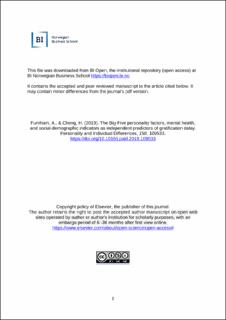| dc.contributor.author | Furnham, Adrian | |
| dc.contributor.author | Cheng, Helen | |
| dc.date.accessioned | 2020-06-09T12:29:41Z | |
| dc.date.available | 2020-06-09T12:29:41Z | |
| dc.date.created | 2019-08-26T12:48:51Z | |
| dc.date.issued | 2019 | |
| dc.identifier.citation | Personality and Individual Differences. 2019,150 (1), 109533 | en_US |
| dc.identifier.issn | 0191-8869 | |
| dc.identifier.uri | https://hdl.handle.net/11250/2657375 | |
| dc.description.abstract | This paper reports on a study testing over 12,000 adults. We were interested in the correlates of gratification delay (GD) (as criterion variable) with gender, age, education and occupation, the Big-Five personality factors, and mental health (as predictor variables). Correlations and regressions showed that all the Big-Five personality factors, mental health, and a set of socio-demographic variables were significant and independent predictors of GD, accounting for 19% of the total variance of the outcome variable. As predicted, Conscientiousness was the strongest correlate. The implications of these findings are discussed along with the limitations of this research. | en_US |
| dc.language.iso | eng | en_US |
| dc.publisher | Elsevier | en_US |
| dc.rights | Attribution-NonCommercial-NoDerivatives 4.0 Internasjonal | * |
| dc.rights.uri | http://creativecommons.org/licenses/by-nc-nd/4.0/deed.no | * |
| dc.title | The Big-Five personality factors, mental health, and social-demographic indicators as independent predictors of gratification delay | en_US |
| dc.type | Journal article | en_US |
| dc.type | Peer reviewed | en_US |
| dc.description.version | acceptedVersion | en_US |
| dc.source.volume | 150 | en_US |
| dc.source.journal | Personality and Individual Differences | en_US |
| dc.source.issue | 1 | en_US |
| dc.identifier.doi | 10.1016/j.paid.2019.109533 | |
| dc.identifier.cristin | 1718702 | |
| cristin.ispublished | true | |
| cristin.fulltext | postprint | |
| cristin.qualitycode | 1 | |

